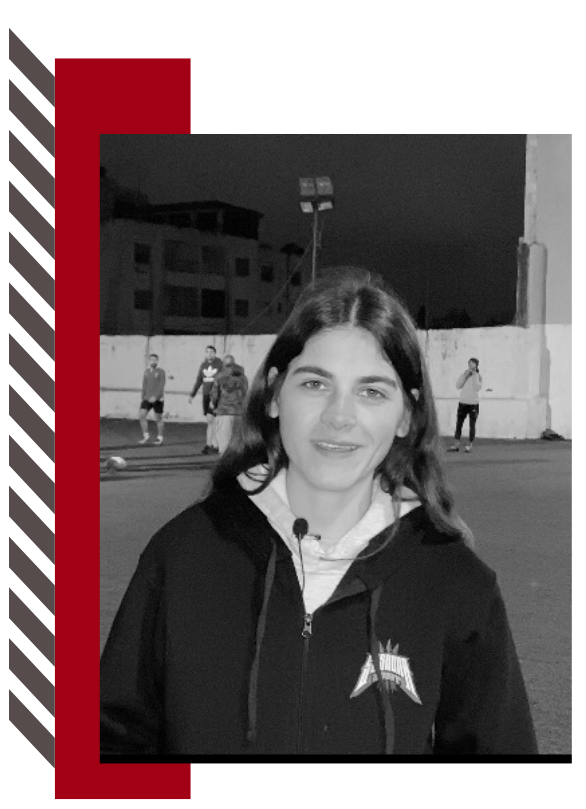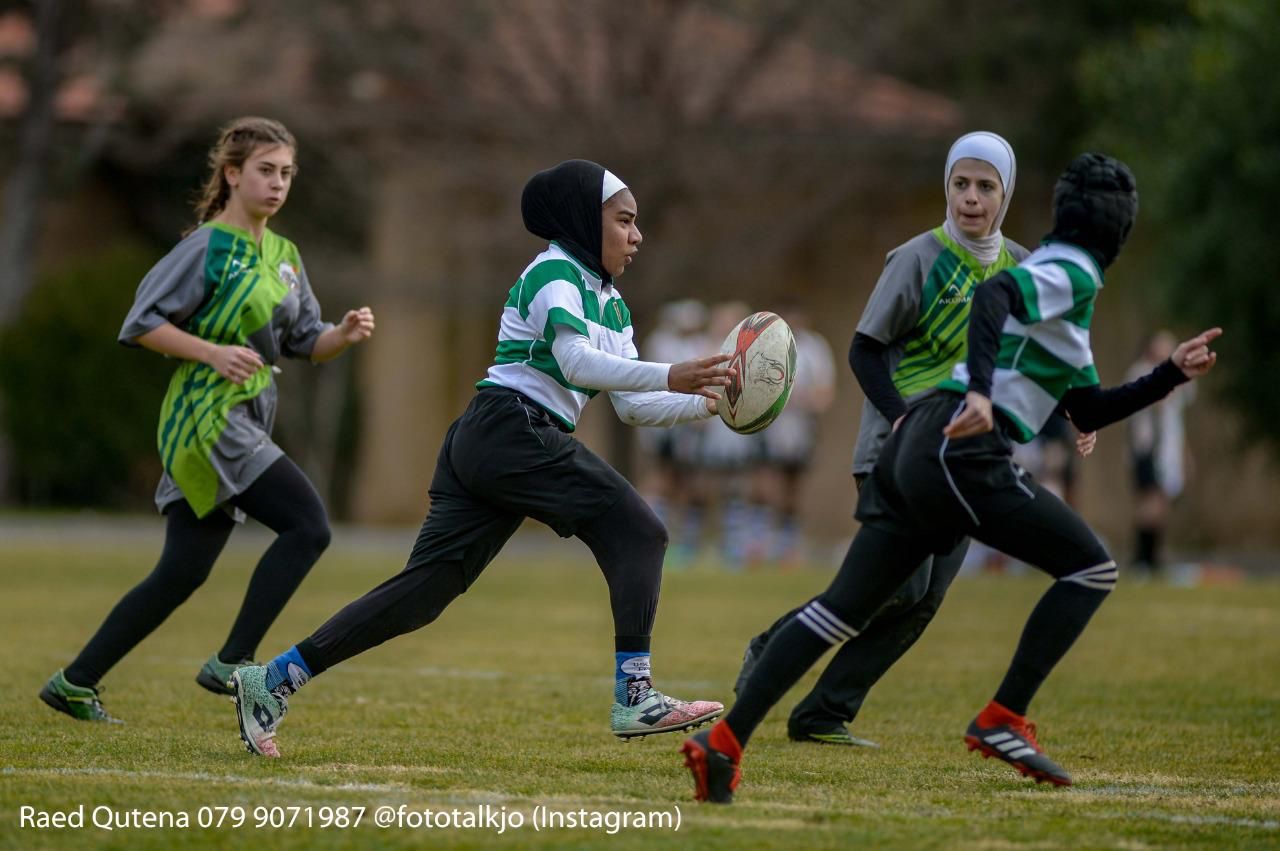
Women’s Rugby in Jordan High Risks And No Compensation
Sixteen-year-old Zain Abzakh began her conversation with us saying,
 Ever since I was little, I have wanted to be part of the national women’s rugby team in Jordan.
Ever since I was little, I have wanted to be part of the national women’s rugby team in Jordan.
She described her journey playing this highly physical game and joining the first women’s rugby team in Jordan, “I have always been a rugby fan, my passion for the game and thanks to the encouragement of my brothers, I joined the first women’s team that started in Citadel Rugby Club in 2018, when I was just twelve years old.”
Zain’s journey did not go smoothly, as she suffered a severe shoulder injury during a match this year, which kept her away from the game for a month. Zain says, “I fell after being tackled by another player, and I felt a severe pain in my shoulder. At the time, I was not provided with any medical assistance except for an ice bag that I put on my injury. Afterwards, I saw a specialist that my family paid for, because rugby players are not covered by health insurance. My family is still paying for my physiotherapy sessions for my shoulder, which has not completely healed.”
Zain’s complaints mirror those expressed by other players and supervisors about the poor infrastructure and lack of financial support provided to clubs by the Jordan Rugby Committee and the Jordan Olympic Committee. There are three rugby clubs in the Kingdom: Citadel, Nomads and Sosruka, and they all have male and female teams.
The Jordan Rugby Committee claims that there are around 500 rugby players in the kingdom of which 150 are active.

Click to view the data
Thirty-four-year-old Hala Amro, a rugby player at the Nomads Club, says that “We have been experiencing the same issues for five years, and there is no improvement in the situation of rugby in the clubs. Training sessions are held in football fields that are far from the centre or sometimes in the outskirts of Amman, which entails high transportation fees on players. The clubs do not have the financial ability to secure transportation, also the club relies on our symbolic monthly subscriptions to help reserve the fields where we train which is expensive. This is financially stressful for us and for our families since most of the players are students. The lack of sponsorship and financial support for the women's team especially was noticed when we had to wear the men’s kit during the 2019 West Asia Rugby Championship because we didn’t have our own. That was the only time we took part in a tournament.”
Supporting clubs is a priority hindered by many factors
Citadel’s women’s team coach, Freih Kawar confirms the difficult financial conditions that rugby clubs face, “I train for free, coaches and referees work for free, and we do not have health insurance, either.” Kawar adds that “The rugby field must be made of natural grass, with a completely flat field and without bumps, but this is not available in Jordan, and this results sometimes in severe injuries among female players.”
Kawar wonders how the Jordan Rugby Committee receives around 35,000 Jordanian Dinars ($50000) annually from the Olympic Committee, but helps the club with only 1,000 Dinars ($1410) throughout the year. The amount is meant to be used in preparing for local tournaments held twice a year. It should also be used to find fields suitable for training. Training sessions (1 hour 30 mins) cost between 45 - 75 Jordanian Dinars, and we usually train three times a week.” The club needs around 10,000 Dinars annually ($14100) for operational costs, Kawar says, “This year, the club did not even receive the one thousand Dinars (allocation from the Rugby Committee).”
The Executive Director of the Jordan Rugby Committee, Aziz Zakaria believes that “All clubs should reconsider their financial status and devise solutions to generate revenues by attracting partnerships and sponsorships from the private sector to support their various sports activities.”

He stressed that “Material and moral support for rugby clubs is a priority for the committee”, but he also acknowledged the insignificance of the financial support provided by the committee. “The poor financial resources of the Jordan Rugby Committee limit its financial support for clubs in general. The Jordan Olympic Committee gives us 35,000 Jordanian Dinars annually ($50000), and this is usually divided over all the committee’s activities and management. Local tournaments and international travel cost around 15,000 Jordanian Dinars alone. The committee supports the local clubs by paying their grass field reservation at the University of Petra throughout the year. This is the only grass field that has accommodated rugby since its inception in Jordan. The committee also provides periodic training and educational workshops for referees, coaches and players in cooperation with the Asian and World Rugby Federations,” Zakaria adds.
For the love of the game
Sosruka Club Manager and Coach, Ahmad Hamouqa formed a rugby team of eleven female players in 2018 despite all the difficulties he faced, “Rugby is a high contact sport and requires a special kind of physical fitness. It was hard to find women with the required athletic aptitude to join, additionally, the game itself was not practised widely or popularly known as a game played by women in Jordan.” Hamouqa continues, “The first participation by Jordanian women abroad was when they participated in the West Asia Rugby Sevens Series Championship held in Qatar in 2019. Our participation was modest because this is a new sport in Jordan, but it was still a good first experience.”
As for the financial status of the club, Hamouqa explained that “The club needs between five and six thousand Dinars annually to reserve fields and two thousand Dinars more to purchase kits for the female players. The one thousand Dinars allocated by the Jordan Rugby Committee to the club annually cannot be relied upon”.
He added, “Most of the crew members work without salaries, they only work to promote this sport. Sometimes, we put up small events to collect some money, other people donate monthly or annual sums to the club, and the players also pay a monthly subscription fee of ten Dinars.”
Nomads club player and co-coach, Mohammad Al-Tamimi stresses that “The slow development of the game is due to the weak support provided by the Jordan Rugby Committee.” He says, “If we had some reasonable support, we would be able to provide health insurance to female players, and we would have more of them playing. We would also be better able to organise the right kind of training.” He adds, “As coaches, we dedicate our time and effort for free only because we love the game, and we wish to develop it.”
Health coverage is a loaded topic
 Health insurance is a matter of concern for all of us
Health insurance is a matter of concern for all of us
this is how the Executive Director of the Jordan Rugby Committee Aziz Zakaria began his speech in response to the clubs’ demands to extend this cover to female players. He said, “We know that clubs are facing financial challenges that prevent them from providing all their players with health insurance cover. On the other hand, we provide health insurance to male and female players in the national teams in cooperation with the Jordan Olympic Committee.”
He explained, “We have tried previously to negotiate a deal with insurance companies, but they have required huge amounts of money that we could not afford. This is a global problem that faces all athletes who play high-contact sports. However, thanks to the efforts of the Asian Rugby Federation, an agreement was recently signed with the United Fidelity Insurance Company based in the United Arab Emirates to provide health insurance at competitive prices of up to 70 Jordanian Dinars per person annually, and all the relevant information has been shared with local clubs.”
On the other hand, Zaid Al-Sarayrah, the official spokesperson for the Jordan Olympic Committee, says, “The committee supports rugby in many financial, media, marketing and logistical aspects.” He points out that “The committee did not receive any complaints from the players.”


















